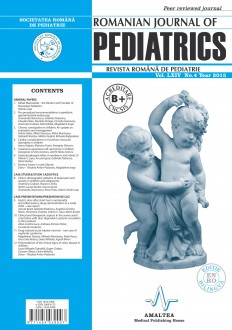SELECT ISSUE

Indexed

| |

|
|
|
| |
|
|
|

|
|
|
|
|
|
|
HIGHLIGHTS
National Awards “Science and Research”
NEW! RJP has announced the annually National Award for "Science and Research" for the best scientific articles published throughout the year in the official journal.
Read the Recommendations for the Conduct, Reporting, Editing, and Publication of Scholarly work in Medical Journals.
The published medical research literature is a global public good. Medical journal editors have a social responsibility to promote global health by publishing, whenever possible, research that furthers health worldwide.
UPDATES ON THE DIAGNOSIS AND TREATMENT OF PEDIATRIC HEPATOBLASTOMA WITH PULMONARY METASTASES
Oana Tatiana Miron, Anca Maria Adavidoaiei, Vlad-Adrian Afrasanie, Doina Mihaila and Ingrith Miron
ABSTRACT
Although the frequency of hepatoblastoma is low, it is the most common primary malignant liver tumor in children. The prognosis of the disease has improved considerably in the last decades due to oncological and surgical treatment advances. Nonetheless, tumors which are diagnosed at an advanced stage still have a poor prognosis. We present the case of a 33-month-old child, diagnosed with high-risk hepatoblastoma (pulmonary metastases) in February 2014. Surgery was performed and the tumor completely removed. Afterwards, chemotherapy treatment was initiated according to a modified SIOPEL-4 protocol – the chemotherapy blocks which should have been administered before surgery were received after the operation. After finishing the chemotherapy, the thoraco-abdominal CT scan indicated a complete response to treatment. The periodic evaluation of the patient revealed the absence of local tumor recurrence, the absence of metastases, and a Lansky performance status of 80 up to now. The administration of targeted molecular therapies, liver transplant, and new chemotherapy drugs could improve the prognosis for patients with high risk hepatoblastoma in the future. Also, modifying the chemotherapy protocols could be considered an option in the achievement of this goal.
Keywords: pulmonary metastases, SIOPEL-4 protocol, complete tumor response.
